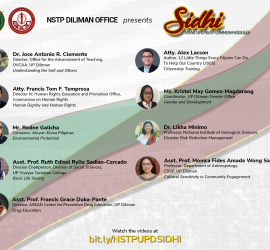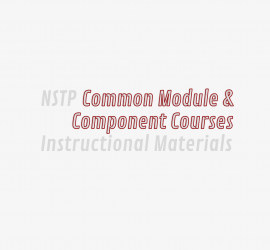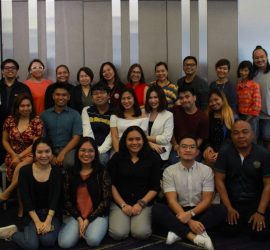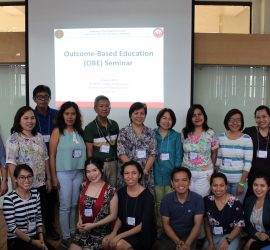Last July, the NSTP Diliman Office launched the “SIDHI: Tatak UPD NSTP Common Modules” knowledge products with nine (9) free instructional materials for NSTP implementers and students of the University of the Philippines Diliman, and the wider public. This lecture videos aim to complement the first batch of NSTP instructional materials on common and component module topics launched in October 2020. Coming from the root word, “sidhi,” meaning “to intensify,” these knowledge products delve deeper and introduce new concepts on the common modules. Based on the recalibrated outcomes-based education-framed Tatak UPD NSTP 1 course, this series features experienced resource speakers from within and outside the University. This project also aims to support the NSTP implementers and students during this shift to remote and blended learning modes by providing accessible and free NSTP resource materials. Here’s the overview of the areas covered by SIDHI videos: Understanding the Self and Others – Dr. Jose Antonio R. Clemente Under this topic, Dr. Clemente discusses the concept of Sikolohiyang Pilipino and how it relates to one’s role and responsibilities in the community. His lecture video also encourages the NSTP students to reflect and understand the nuances of their relationship with the community as an individual and as part of it, when implementing NSTP projects. Citizenship Training – Atty. Alexander “Kuya Alex” L. Lacson Atty. Lacson, author of bestselling patriotic books, a poet, a lawyer, and a civil society leader, gives some tips and discusses how doing simple things can help us promote citizenry, as people of our country, and as NSTP students. Human Dignity and Human Rights – Atty. Francis Tom F. Temprosa Dir. Temprosa of Commission on Human Rights (CHR), discusses the Human Rights Approach and how it can be best applied when engaging with the community, especially during NSTP project implementation. Gender and Development – Ms. Kristel May Gomez-Magdaraog Building on the introduction and orientation of SOGIESC, laws and mandates on gender development, Ms. Gomez-Magdaraog now focuses her discussion on how to best integrate and practice Engendering NSTP implementation, especially during community engagements. Environmental Protection – Mr. Rodne R. Galicha Mr. […]
Common Module
On October 15, 2020, the NSTP Diliman Office disseminated 11 free online NSTP instructional materials on common and component module topics for UP Diliman program implementers and the wider public. In partnership with TVUP, the television arm of the University, the project aims to strengthen NSTP remote learning course offerings, aid NSTP students and instructors during this semester’s remote learning mode, provide easily accessible NSTP materials for instructors and students, and provide additional knowledge products to the Tatak UP Diliman NSTP module. This set of instructional materials is based on a recalibrated outcomes-based education-framed NSTP 1 course. These knowledge products, characterized through a series of video-recorded discussions by content experts, are nods to NSTP Diliman common modules. The topics of the modules are a result of a series of writeshops that standardized the learning objectives and topics of UP Diliman NSTP content. The NSTP modules were approved by the NSTP Diliman Council through the guidance of Dr. Rosella Torrecampo, the Writeshops Resource Person. In September, TVUP, headed by Professor Emeritus Grace J. Alfonso, started the recording sessions with our pool of speakers from various colleges and departments of the University. “These materials would greatly help the community of NSTP implementers in teaching their students,” said Director Jonalou S. Labor, PhD. He added that the Office pushed through with these content in order to provide support both for teachers and students not only in UP Diliman but to other higher education institutions in the country. Here are the materials: Tatak UPD NSTP Orientation – Asst. Prof. Arlyn P. Macapinlac NSTP Tatak UPD Orientation covers topics on the role of UP as a public service university, the rationale and Implementing Rules and Regulations (IRR) of NSTP, the Tatak UPD NSTP Framework, and the reservist program. Understanding the Self and Others – Ms. Athena Charanne R. Presto Understanding the Self and Others discusses different perspectives on the concept of self and relates these to one’s role and responsibilities in society. The module also prompts students to explore possible community engagement involvement. Human Dignity and Human Rights – Ms. Marielle Antoinette H. Zosa Human […]
The NSTP Diliman Office held its API Writeshop on OBEdization of NSTP Common Module Topics Syllabi last October 14, 2019 at Hive Hotel, Quezon City. The whole-day workshop was attended by NSTP coordinators and instructors and facilitated by Prof. Rosella Torrecampo from the Office for the Advancement of Teaching and Prof. Arlyn Macapinlac from the NSTP Diliman Office. Director Macapinlac’s opening remarks reminded the attendees of how the new NSTP module continuously pursues the creation of a more holistic experience for the students through the OBEdized syllabus. She reiterated that the new module wants to ”develop service to the nation through empowerment and participatory leadership” of students. After her address, Director Macapinlac introduced Prof. Rosella Torrecampo as the workshop’s resource speaker. She also encouraged all the participants to develop learning objectives that target higher order thinking skills such as analysis and application, and highlighted that “Tatak UPD NSTP” aspires to produce UP Diliman students who are nationalistic, visionary, and competent. With this in mind, the OBEdization of the NSTP Common Module was geared towards a student-centric approach anchored on the objectives of the module. The current Common Module consists of eight (8) Common Module Topics (CMT). First, CMT1 introduces the course through the NSTP Tatak UPD Orientation followed by CMT2 which focuses on Understanding the Self and Others. CMT3 and CMT4 discuss Human Dignity and Human Rights, and Gender and Development/Anti-Sexual Harassment Code (ASH Code), respectively. CMT5 tackles Citizenship Training. Furthermore, Disaster Risk Reduction Management and Basic Life Saving are covered in CMT6a and 6b while Environmental Protection will be taught in CMT7. The conceptualization of CMT8 is a new addition to NSTP Common Module which intends to cover the topic of Drug Education. In order for the attendees to grasp the nature of this new topic, Dr. Maria Daniela Bantiles, Chief of UP Health Service Public Health Unit and University Health Service Deputy Director, served as a resource person and gave her key insights regarding the intended learning outcomes of CM8. Her points were inspired by the content of the Comprehensive Dangerous Act of 2002. With the collaborated insights from Dr. […]
A whole day Outcome-Based Education (OBE) Seminar Workshop was held last 31 August 2018 at the G.E. Theater, College of Engineering, UP Diliman for NSTP instructors from different colleges. NSTP Diliman Director Prof. Arlyn Macapinlac, during her welcome remarks, emphasized the need to continuously improve the existing NSTP Common Module. As the university calls to conform with Outcome-Based Education principles, the NSTP Diliman Office deemed it fit to follow suit. It is directed towards producing an “OBEdized” syllabus. Dr. Amelia Fajardo of the Curriculum Studies Department of the College of Education, UP Diliman, served as the resource person for the seminar-workshop. The following were discussed during the seminar: Differentiation of curriculum from instruction The relationship of curriculum to instruction Three domains of curriculum Bases for the determination of the elements of the curriculum Important features of OBE How to formulate OBE learning objectives Curriculum and instruction were differentiated from each other using the rosary and the puzzle ideology; the rosary as a prescriptive model of curriculum following a specific order of instruction, while the puzzle as a student-based curriculum which reflects that instruction depends upon the player. It was noted that there is no instruction if there is no curriculum, hence, a crafted curriculum is important in order to proceed with standardized instruction. It was also clarified that instruction is not a way of teaching, but a plan which answers to the elements’ learning intent, learning content, teaching strategy, and assessment. From this, Dr. Fajardo shared that curriculum development is defined as a decision-making process on these four elements of the curriculum. Further, factors that influence the curriculum are philosophy of education, socio-cultural context, theories of learning, and the demands of the industry or profession. The afternoon session was continued at the Maynilad Room of the College of Engineering, UP Diliman. Before the workshop proper, Dr. Fajardo lectured on the formulation of OBE objectives and program. The first task of the workshop is to envision the ideal characteristics of the NSTP graduates based on the NSTP program vision, mission, and goals (VMG). Program outcomes, which correspond to the measurable […]




